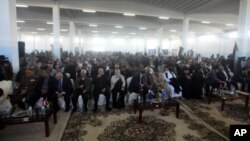Libyans from the eastern region of Brega held a constituent assembly Tuesday in the oil town close to Benghazi with the avowed goal of establishing a loose form of federalism along the lines of the country's 1951 constitution.
Political, civic and militia leaders in Brega applauded the declaration of an autonomous federal region in the east of the country. The area, known as Cyrenaica, had once been an autonomous Italian colony and later a federal district under Libya's monarchy.
But the east's enthusiasm for federalism is not shared by Libya's interim authorities in the capital.
Both Interim Prime Minister Abdel Rahim al-Keeb and National Transitional Council leader Mustafa Abdel Jalil have expressed hostility recently towards having a federal system of government in Libya, saying it could lead to a break up of the country.
The Brega conference chose Ahmad Zoubeir al Senoussi, Libya's longest held political prisoner during the rule of ousted leader Moammar Gadhafi, to lead the new federal region. Senoussi insisted that Libya would not break up, but that a federal system best protects the rights of all.
"We declare our loyalty to our God and our Prophet and then to our country, and we testify that Libya is big enough for all its citizens and that the federal system is a guarantee for the rights of all in a greater Libya, which is indivisible," he said.
Abou Bakr Bayara, a Libyan who spent many years exiled in the United States, also addressed the conference, challenging NTC leader Mustafa Abdel Jalil's denunciation of federalism.
He disagreed with claims that federalism means the dividing up the country. He said the U.S., Germany, Switzerland and Australia also have federal systems and that it represents no danger to their unity.
The meeting in Brega was attended by numerous eastern militia, military and tribal leaders, all apparently eager for a greater say in how their local affairs are run. Libyan Army Colonel Saleh Salem Obeidi insisted that the country's military would support the will of its people.
He said the armed forces is at the disposition of the people and will agree to whatever the people ask of it, unlike its position during the rule of Moammar Gadhafi.
Omar Ashour, who teaches political science at the University of Exeter in Britain, argued that the tribal make-up and wealth of Libya's east, west and south are different and that the fall of long-time strongman Gadhafi is likely to exacerbate regional differences, long term.
"You have a very strong tribal element in the east and the east in generally is richer, whereas you have the sources of power who are concentrated in the west in Tripoli and, I think, in the aftermath, it looks a bit like there's an Iraqi element there," explained Ashour. "The strong dictatorship was keeping everything together by repression and now that dictator, whether it was Saddam Hussein or Colonel Gadhafi, are gone and you have all these historical issues. Whether the wealth disparities, whether the tribal factors, whether their regional identities starting to re-emerge again and resurface and manifest themselves."
Ashour argued that most of the hundreds of militias that emerged in the battle to overthrow Gadhafi last year were formed on a “regional, rather than a tribal or ideological basis.” The National Transitional Council does not control large swathes of the country, he said, raising the possibility of Libya's adopting a federal system following elections in July and the writing of a new constitution.




